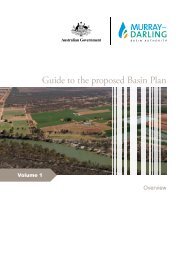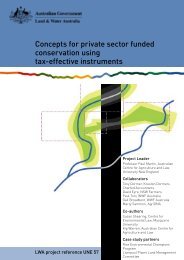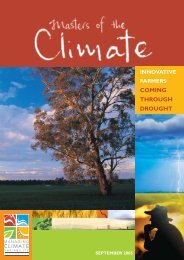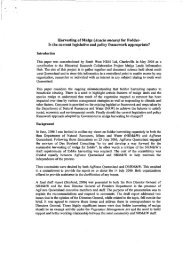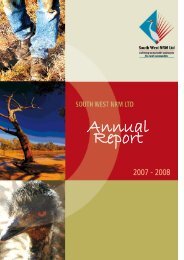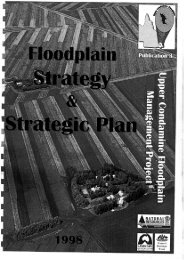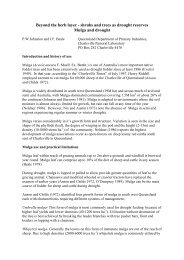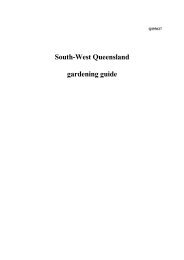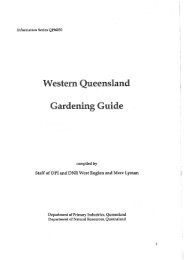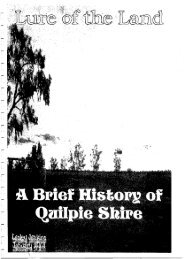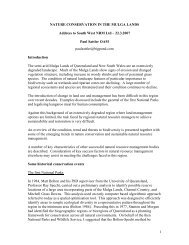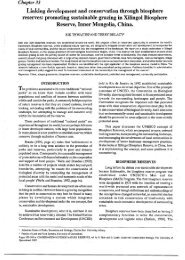soil-conservation-people-religion-and-land.pdf - South West NRM
soil-conservation-people-religion-and-land.pdf - South West NRM
soil-conservation-people-religion-and-land.pdf - South West NRM
Create successful ePaper yourself
Turn your PDF publications into a flip-book with our unique Google optimized e-Paper software.
HOW GREEN IS MY MALLEE:<br />
ATTITUDES TO T<br />
AUSTRALIAN<br />
Dr Brian Roberts, DDIAE<br />
Background to Today's Ecological ~ealities<br />
If you visit the Botanic Gardens in Sydney you will see a very<br />
small monument with a plaque stating that agriculture<br />
commenced in Australia on that site. It was from there that<br />
our l<strong>and</strong>-based industries grew, from the 10 acres at Farm Cove<br />
to the impressive export industry of today. From those<br />
original battlers grew the unique independent cockie of today.<br />
To put our farmers in today's perspective we must slcetch the<br />
global situation in which we find our Australian l<strong>and</strong>holder<br />
<strong>and</strong> his relationship to his l<strong>and</strong>.<br />
Only 11% of the earth's surface is arable l<strong>and</strong> suitable for<br />
crop production <strong>and</strong> from this we must feed 5 billion <strong>people</strong>.<br />
Asia, Africa <strong>and</strong> <strong>South</strong> America have population doubling times<br />
of 38, 24 <strong>and</strong> 30 years respectively. This year 11 million<br />
Chinese <strong>and</strong> 14 million Indians will be born, while world l<strong>and</strong><br />
resources are lost through erosion <strong>and</strong> salination at the rate<br />
of 7% per decade. China, with 23% of the world's population<br />
was able to reduce its population growth from 3.4% to 2.0<br />
after introducing the one child family policy in 1979 (Davis &<br />
Wilsher, 1986) . India's advantage gained from the green<br />
revolution in grain production, has been lost through the<br />
failure of its birth control programmes. In Bangladesh, Kenya<br />
<strong>and</strong> Ghana, birth control is used by only 8%, 7% <strong>and</strong> 4% of<br />
couples respectively (Anon, 1981).<br />
The good news is that while the world population was<br />
increasing at over 2% during the 1960s, it has declined to<br />
1.63%-today. The bad news is that two thirds of the world<br />
rema.in hungry while the gains made by improved food production<br />
technology are cancelled out by l<strong>and</strong> degradation in many<br />
countries including Australia.<br />
Fifteen years ago the writer (Roberts, 1974) described our<br />
predicament as follows: Despite numerous warnings over the<br />
years, Man has recently been somewhat bewildered by the fact<br />
that Nature has slapped him in the face for insulting her<br />
ecosystem. The animal which inhabits the urban habitat has<br />
become aware of uncomfortable changes in his immediate<br />
environment. Nature has answered back <strong>and</strong> Man has stumbled<br />
into an ecological trap. Civilizations have been living on<br />
promisory notes for generations <strong>and</strong> now they're falling due<br />
all over the world. The wilderness is no longer an<br />
environment to be conquered by Man, but a shrinking source of



